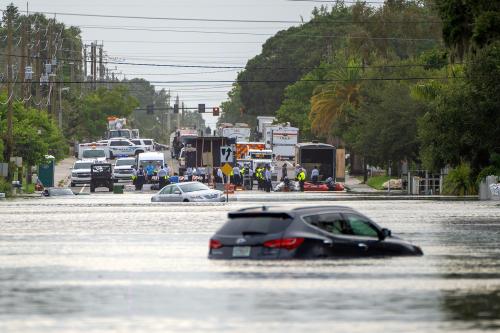2026
The U.S. Environmental Protection Agency (EPA) creates and maintains a wealth of data that can inform high-quality research on the most pressing policy issues in environmental economics. However identifying, accessing, and understanding these data can be a formidable task. On May 3, the Brookings Center on Regulations and Markets held a workshop to help young scholars overcome these issues.
The workshop was specifically aimed at graduate students who are interested in environmental economics and policy; who want to learn more about issues of current regulatory importance; and who want to understand the data that has been and can be used to explore these issues. The program featured agency personnel who gave an overview of various data sets and researchers who have used EPA data in their graduate work. In addition, scholars from Brookings and academic institutions across the country discussed their experience with EPA data. Attendees gained a better appreciation of the types of data EPA creates and maintains, how to access and use that data, and how to match research questions to the data.
PROGRAM AGENDA
1:00 pm Welcome and introductory remarks
-
- Katja Seim, Professor of Economics, Yale School of Management
- Richard Allen, U.S. EPA Chief Data Officer
1:20 pm Overview of EPA datasets relevant to economics
This session features two talks give a broad overview of potentially relevant EPA data: a summary of lessons learned from over a dozen researchers who have used EPA data and suggestions for generating research ideas.
- Lessons Learned from Using EPA Data
- Jay Shimshack, Associate Dean for Academic Affairs, Professor of Public Policy and Economics, Batten School, University of Virginia
- Where to get Research Ideas
- Alex Marten, U.S. EPA Statistical Officer and Associate Director, National Center for Environmental Economics
1:50 pm Break
2:00 pm Short talks by EPA data owners and users
This session is comprised of four talks by EPA staff who can describe some of the most relevant EPA data sets and how to access them.
- EmPOWER and Related Data
- Justine Huetteman, U.S. EPA, Clean Air Markets Division
- Toxics Release Inventory and Chemical Data Reporting
- Speaker to be announced
- ECHO Data Downloads
- Courtney Tuxbury, U.S. EPA, Office of Compliance
- EJSCREEN/RSEI for Environmental Justice Analysis
- Peiley Lau, U.S. EPA, National Center for Environmental Economics
2:30 pm Longer talks #1 and #2
The session features two longer talks by young scholars who have used EPA data in their research.
- Air Quality System Monitoring and Strategic Behavior
- Eric Zou, University of Oregon and NBER
- Toxics Releases and Children
- Irene Jacqz, Iowa State University and Harvard University
3:15 pm Break
3:30 pm Longer talk #3
In this talk, Professor Evans will describe 2 research projects that use data obtained from public records requests to EPA and a state environmental agency. She will use the projects to share insights on navigating the public records request process.
- Using Public Records Requests to Complement Available EPA Data
- Mary Evans, University of Texas, LBJ School of Public Affairs
4:00 pm Short talks by data users
This session features talks by younger scholars who have used various EPA data sets in their research. These data include the Greenhouse Gas Reporting Program, the Water Quality Portal, the Safe Drinking Water Information System, and air quality monitoring data.
-
- Lavender Yang, Carnegie Mellon University
- Tina Andarge, University of Massachusetts-Amherst
- Jiameng Zheng, UIUC
4:30 pm End
